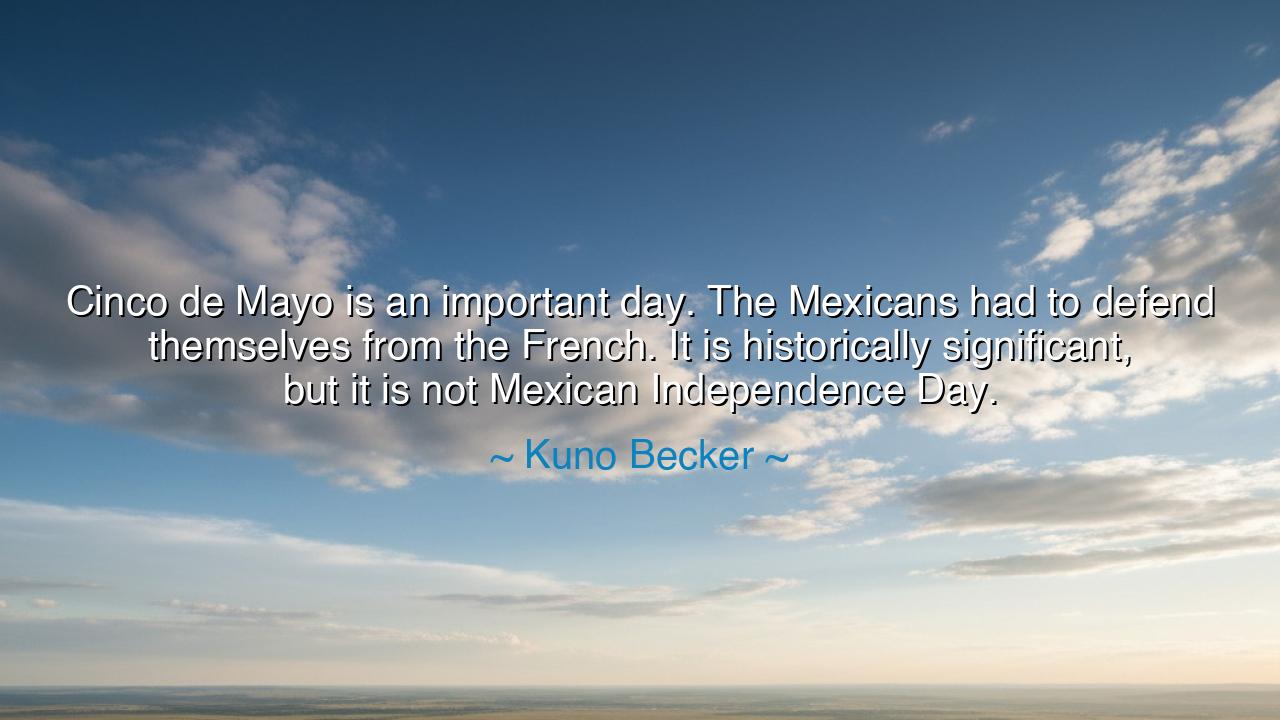
Cinco de Mayo is an important day. The Mexicans had to defend
Cinco de Mayo is an important day. The Mexicans had to defend themselves from the French. It is historically significant, but it is not Mexican Independence Day.






Listen closely, O children of the future, for the words of Kuno Becker carry with them both wisdom and clarity about the importance of understanding history in its true light. He declares, "Cinco de Mayo is an important day. The Mexicans had to defend themselves from the French. It is historically significant, but it is not Mexican Independence Day." These words remind us that history is a complex and layered story, and though some moments in time stand out, they are often misunderstood or oversimplified. Cinco de Mayo is indeed a day of great significance, but it is not the Independence Day of Mexico—a day that marks the beginning of the nation’s struggle for sovereignty and self-determination.
The true Independence Day of Mexico is celebrated on September 16, a day when, in 1810, Miguel Hidalgo, a priest and revolutionary leader, called for the end of Spanish rule over Mexico. His Grito de Dolores marked the beginning of the Mexican War of Independence, a struggle that would last for over a decade, and ultimately culminate in Mexico’s freedom from Spanish colonial rule. Hidalgo and other leaders of the independence movement, like José María Morelos and Vicente Guerrero, became symbols of resilience and the fight for sovereignty. Their victory was not achieved in a single day but through years of sacrifice, struggle, and unrelenting resolve. The battle for independence is not one singular event, but a long and storied journey, a truth that Becker reminds us of by distinguishing Cinco de Mayo from Independence Day.
Cinco de Mayo, while not the true day of independence, marks another critical chapter in Mexico’s history—the day in 1862 when the Mexican army, led by General Ignacio Zaragoza, defeated the powerful French forces at the Battle of Puebla. The French, under Napoleon III, sought to expand their empire by imposing a puppet monarchy on Mexico. The victory at Puebla was a symbol of resistance, a victory that resonated far beyond the borders of Mexico, showing that even the mightiest of empires could be challenged. It was a victory for the Mexican people, a demonstration that freedom was worth fighting for, even in the face of overwhelming odds. But it is important to recognize that this battle was not the end of the war; it was merely one of the key moments in a much longer struggle for sovereignty.
This struggle for sovereignty is not unique to Mexico, O children, for throughout history, peoples and nations have been forced to defend their freedom from foreign invaders. The Greeks, in their battle against the Persians, fought not just for their land, but for their independence and the right to live as they saw fit. The Athenians knew that their identity—their very essence as a people—depended on their ability to defend themselves. In 480 BCE, at the Battle of Salamis, the Greeks defeated the Persian navy, securing their freedom for generations to come. Like the Greeks, the Mexicans in 1862 fought not just for land, but for the preservation of their sovereignty, and the message of Cinco de Mayo became a testament to their strength and resolve.
And yet, O children, the lesson that Becker imparts is profound. While Cinco de Mayo is indeed a day of great importance in the history of Mexico, it is not the day that marks the birth of the nation’s independence. Understanding this distinction allows us to honor the true struggle for freedom—a struggle that takes place not just in battles, but in the ongoing effort to secure and protect the sovereignty of a people. Cinco de Mayo is a reminder that the fight for independence is often won in small, heroic moments, but those moments must be placed in the broader context of the long journey toward freedom.
The lesson here, O children, is one of respect for history in its fullness. Cinco de Mayo is a celebration of resistance and triumph, but it is not the culmination of Mexico’s fight for independence. Just as Mexico’s Independence Day honors the beginning of a long struggle, Cinco de Mayo honors the resilience and courage of those who fought in a pivotal battle. In our own lives, we must learn to recognize the significance of the small victories in the larger context of our journeys. Every victory is part of a greater story—a story of struggle, resilience, and the unyielding pursuit of freedom.
Take this wisdom, O children, and remember that the pursuit of freedom and sovereignty is never a single event. It is a journey marked by many battles—some grand, some small—that shape the course of history. Whether on the fields of battle like those of Puebla, or in the quiet corners of everyday life, the fight for independence is a continuous process, one that requires strength, courage, and the willingness to rise again and again. Celebrate the victories, yes, but never forget the long road they have paved, and let this understanding guide you as you face your own struggles for freedom and sovereignty in the world ahead.






AAdministratorAdministrator
Welcome, honored guests. Please leave a comment, we will respond soon